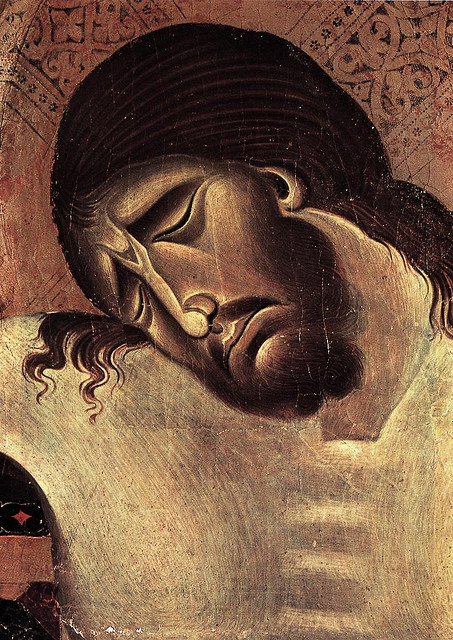We run our website the way we wished the whole internet worked: we provide high quality original content with no ads. We are funded solely by your direct support. Please consider supporting this project.

One Word
While I’ve lately been pretty distracted finishing up Benefit of the Doubt (Baker, 2013), my goal is to sprinkle in posts that comment on the distinctive commitments of ReKnew a couple of times a week. I’m presently sharing some thoughts on the second conviction of ReKnew, which is that Jesus Christ is the full and final revelation of God. Jesus is thus not to be placed alongside of other portraits of God in Scripture, which is what Christians have tended to do throughout history. Rather, everything in Scripture should be read through the lens of Christ and, more specifically, through the lens of the cross, for as I’ve argued, everything Jesus is about is summed up, and woven together, around the cross.
John 1:1 teaches us that Jesus is “the Word” who was “in beginning with God” and who is himself “God.” While scholars nuance it differently, all agree that the concept of the “Word” (logos), as John uses it, refers to God’s self-communication. As John Robinson put it, Jesus is “the face of God.” And notice the definite article. Jesus is the Word. God doesn’t having many Words. He has one, and it’s Jesus Christ. Whenever God speaks or presents himself to us, John is saying, he looks like Jesus.
So far as I can see, this means it is illegitimate to ever think we can supplement or qualify what we learn about God in Jesus Christ with other words in Scripture. Scripture’s words are only the Word of God insofar as they agree with, and in fact point to, the revelation of God in Christ. In fact, Jesus himself reflects this conviction when he chastises the religious leaders of his day saying they study Scripture while failing to see that it all “testifies about me” (Jn 5:39). So too, the resurrected Jesus chided two of his disciples for being “slow to believe all that the prophets have spoken” about him. “Did not the Messiah have to suffer these things and then enter his glory?” he asked. (Lk 24:25-26). And then, Luke says,” beginning with Moses and all the Prophets, he explained to them what was said in all the Scriptures concerning himself” (Lk 24:27).
It is apparent that Jesus is the Word of the words of Scripture. God “breathed” (2 Tim. 3:16) all Scripture for the ultimate purpose of “breathing” his Word, Jesus. In this light, the last thing we should ever do is try to supplement, let alone qualify, the revelation of God in Christ with other words.
Category: General
Tags: Bible, Cruciform Theology, Jesus, ReKnew
Related Reading

Jesus Came to Bring a Sword?
Jesus said: “Do not suppose that I have come to bring peace to the earth. I did not come to bring peace, but a sword” (Mt 10:34). Some, both modern scholars along with church leaders since the fourth century, have used this passage as evidence to argue that Jesus is not altogether non-violent. When we…

God Became What He is Not To Reveal What He Is
We are saved because Jesus became the curse of the law for us (Gal. 3:13). So too, the way Christ freed us from the condemnation of sin and enabled us to “become the righteousness of God” was by becoming sin for us (2 Cor. 5:21). What is more, since the curse of the law includes enslavement to…

Is Jesus Unique?
The Search for a Non-Unique Jesus Built into the naturalistic assumption that drives the liberal New Testament search for the “man behind the myth” is the notion that, whoever Jesus was, he cannot have been utterly unique. The laws that operate in the world today, including the laws of human behavior, have always operated. And…

Crucifying Transcendence
The classical view of God’s transcendence in theology is in large borrowed from a major strand within Hellenistic philosophy. In sharp contrast to ancient Israelites, whose conception of God was entirely based on their experience of God acting dynamically and in self-revelatory ways in history, the concept of God at work in ancient Greek philosophy…

God’s Aikido Way of Defeating Evil
Greg continues his thoughts on the atonement with this installment highlighting the way God uses the evil intentions and actions of his enemies to bring about good. And because this strategy is based in love, the demons who encountered Christ could not possibly imagine what he was up to. They ended up participating in their…

Podcast: Could Jesus Have Sinned? (part one)
Greg considers the nature of temptation and the temptability of God. http://traffic.libsyn.com/askgregboyd/Episode_0114.mp3
